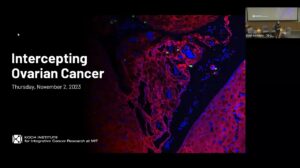NEW YORK (Reuters Health) – Australian and Canadian researchers have shown in lab experiments that L-type amino acid transporters (LATS) are crucial to the growth and proliferation of castration-resistant prostate cancer (CRPC) cells.
“Targeting LAT transporters, thereby inhibiting leucine uptake, may offer a new therapeutic opportunity for metastatic CRPC,” the researchers conclude in their paper in the Journal of the National Cancer Institute online September 19.
As editorialist Dr. Andrew R. Tee explains, “metastatic castration-resistant prostate cancer hungers for leucine.” The L-type amino acid transporters import branched-chain amino acids such as leucine, which is rapidly utilized to drive growth and proliferation.
To investigate the role of LATs in prostate cancer, Dr. Jeff Holst, at the Origins of Cancer Laboratory in Newtown, NSW, Australia, and colleagues used human prostate cancer tissue microarrays to determine what genes and signaling pathways are associated with LAT function.
They found that LAT3 protein was expressed at all cancer stages, and that LAT inhibition suppressed M-phase cell cycle genes, including critical regulatory genes in castration-resistant prostate cancer, as well as more than 100 genes that are overexpressed in metastasis..
The team went on to study the effects of inhibiting LAT1 and LAT3 in a xenograft mouse model. Knockdown of either of the LATs in xenografts inhibited tumor growth and metastasis in vivo, according to the report.
While the results suggest that targeting LATS may be an effective cancer therapy, Dr. Holst and colleagues sound a note of caution. “It remains to be determined which other cell types may also be inhibited by targeting LAT1 or what resistance mechanisms may be triggered.
They add, “In particular, LAT1 was recently shown to be critical in effector T-cell differentiation and pathogen response, suggesting there may be immune side effects of targeting LAT1 that needs to be tested in preclinical models.”
In his editorial, Dr Tee, with the Institute of Cancer and Genetics at Cardiff University, UK, describes the study as “a landmark article that uncovers the Achilles heel of prostate cancer.”
He continues, “This pioneering piece of cancer research has huge clinical implications for future prostate cancer studies and therapies through targeting LATs. Furthermore, this study indicates that amino acid transporters can potently drive cell growth, proliferation, and metastasis. This work is likely to impact research on other sporadic cancers, which may be equally as reliant on amino acids for their growth and sequential transformation.”
SOURCE: Targeting Amino Acid Transport in Metastatic Castration-Resistant Prostate Cancer: Effects on Cell Cycle, Cell Growth, and Tumor Development
SOURCE: Metastatic Castration-Resistant Prostate Cancer Hungers for Leucine
J Nat Cancer Inst 2013




